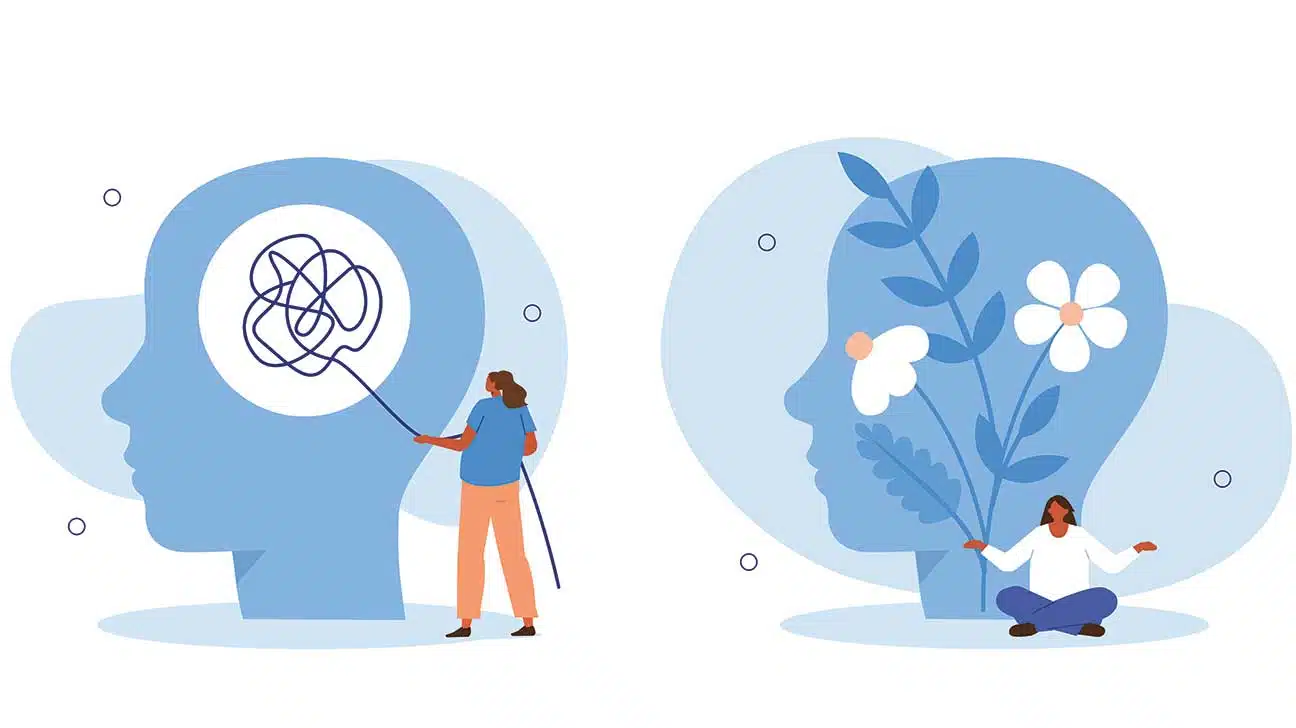
Mental health treatment in an addiction recovery program could refer to treatment approaches for addiction, since addiction is a mental health disorder.
However, it usually refers to treatment options for people who are experiencing both a substance use disorder (SUD) and another, co-occurring mental health disorder, or a dual diagnosis.
Dual diagnosis treatment is typically necessary for people with co-occurring disorders because a mental health disorder can contribute to or be exacerbated by substance abuse.
Do Rehab Centers Offer Mental Health Treatment?
Yes, some rehab centers offer mental health treatment along with addiction treatment. This is often called dual diagnosis or co-occurring disorder treatment.
With addiction and depression, an anxiety disorder, or another mental health condition, the two disorders are intertwined, so the best way to treat one is to treat the other at the same time.
What Mental Health Disorders Do Rehab Centers Treat?
You can find treatment for a number of mental health disorders that co-occur with SUDs.
These include mood disorders such as:
- major depressive disorder
- persistent depressive disorder
- bipolar disorder
They also include anxiety disorders such as:
- generalized anxiety disorder
- phobias
- social anxiety disorder
Additionally, you can find treatment for personality disorders such as:
- schizophrenia
- borderline personality disorder
- obsessive-compulsive personality disorder
You can find treatment for these and other mental health disorders, such as stress- or trauma-related disorders like post-traumatic stress disorder (PTSD), at many addiction treatment centers today.
Dual Diagnosis Treatment Approaches
Dual diagnosis treatment is a treatment approach that addresses both disorders at the same time.
This may include medication-assisted treatment (MAT) for addiction or psychotropic drugs for mental health disorders, including medication management services.
However, dual diagnosis treatment will certainly include behavioral therapies that can be used to address both disorders at once.
Cognitive Behavioral Therapy (CBT)
CBT is a broadly used treatment for substance use and mental health disorders such as the ones mentioned above because it addresses issues common to all mental health conditions.
A therapist using CBT will start with the premise that psychological or substance use problems stem in part from unhelpful thought patterns and beliefs.
CBT sessions can help identify those thoughts and beliefs, which aren’t always apparent, and replace them with more realistic beliefs, leading to healthier behaviors.
Therapeutic Communities (TC)
TCs are typically involved in the context of long-term residential treatment programs.
TCs focus on group activities to resocialize people facing co-occurring disorders. This approach is also used for people involved in the criminal legal system, unhoused people, and neglected teens.
Dialectical Behavior Therapy (DBT)
DBT is a form of cognitive behavioral therapy that uses similar processes as CBT but also addresses emotional regulation.
It was originally developed to treat borderline personality disorder but has since been used to effectively treat suicidal ideation, self-harming behavior, and other self-destructive behaviors.
Contingency Management (CM)
CM is an incentive-based treatment that is often used in conjunction with other treatments. It provides a rewards-based approach to create incentives for people to choose healthy behaviors.
These behaviors may include reducing smoking, getting a clean drug test, or showing up to meetings on time. Rewards may include movie vouchers, gift cards, or other incentives.
Find Addiction Treatment Today
If you or a loved one is looking for addiction treatment, call us today for more information about recovery options, the treatment process, and how to begin the journey to sobriety.
Addiction Resource aims to provide only the most current, accurate information in regards to addiction and addiction treatment, which means we only reference the most credible sources available.
These include peer-reviewed journals, government entities and academic institutions, and leaders in addiction healthcare and advocacy. Learn more about how we safeguard our content by viewing our editorial policy.
- American Psychological Association - What is Cognitive Behavioral Therapy?
https://www.apa.org/ptsd-guideline/patients-and-families/cognitive-behavioral - National Association for Mental Illness - Dual Diagnosis
https://namica.org/illnesses/dual-diagnosis/#:~:text=Treatment%20options%20include%20detoxification%2C%20inpatient,%2C%20medications%2C%20and%20support%20groups. - National Institute on Drug Abuse - Research Report Common Comorbidities with Substance Use Disorders Research Report What are the treatments for comorbid substance use disorder and mental health conditions?
https://nida.nih.gov/publications/research-reports/common-comorbidities-substance-use-disorders/what-are-treatments-comorbid-substance-use-disorder-mental-health-conditions - Verywell Mind - Dialectical Behavior Therapy (DBT): Definition, Techniques, and Benefits
https://www.verywellmind.com/dialectical-behavior-therapy-1067402 - Verywell Mind - The Basics of Assertive Community Treatment
https://www.verywellmind.com/assertive-community-treatment-4587610


